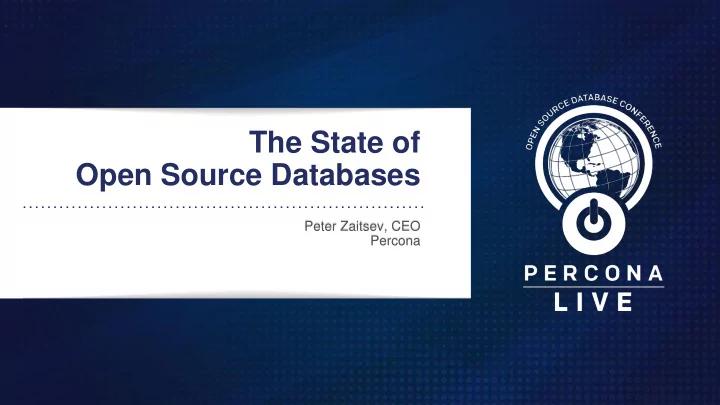

The State of Open Source Databases Peter Zaitsev, CEO Percona
What a Year! Huge changes for Open Source and Open Source databases
RedHat Acquired by IBM Image Source: https://techcrunch.com/story/ibm-acquires-red-hat/
Open Source Corporate Activity Elastic and Pivotal complete IPOs Mulesoft Acquired for $6.5bn, GitHub for $7.5bn MongoDB tripled its market up in 2018 $7.7bn Cloudera and Hortonworks merge to form Hadoop powerhouse
Open Source Software Traction Source: https://twitter.com/asynchio/status/1103408136860327936
Unicorns Changing from Open Source Licenses MongoDB changes Software License to SSPL (Server Side Public License) Elastic, Confluent, and Redis Labs releasing some components with Source Available License
Cloud and Open Source Should Software Are Open Source Are Cloud Providers Vendors be able to Software Users abusing Open maintain DBaaS interests are the Source software? Monopoly? same as Vendors ? How should Cloud Providers be compelled to contribute to Open Source?
Are you ready to share the pie ? Do we want to create a bigger pie, or have it all to ourselves?
Open Source is a Strategic Priority 69% of respondents say Open Source is of strategic importance to Enterprise infrastructure 68% of respondents increased Open Source Software usage over the last year 59% of respondents will increase usage further in the coming year Source: https://www.redhat.com/en/enterprise-open-source-report/2019
Top Databases Only Open Source databases are showing growth! Source: https://db-engines.com/en/ranking
PostgreSQL Database of the Year and Proprietary Database Migration Target of Choice
Reasons to Adopt Open Source Databases The top three reasons to adopt Open Source databases:
Fears of Open Source Technologies The main fears when adopting Open Source database technology:
Self Support ● 64% of respondents rely on self-support when running Open Source database technology ● Only 36% use external support
License Preferences Source Available Permissive Licenses licenses are are the most considered closer to preferred by proprietary licenses respondents than Open Source
Relational Databases are Still Rocking it ● 97% of respondents use Open Source Operational Relational Databases ● 48% of respondents use Search Engines ● 37% of respondents use Document Databases
Public Clouds ● 50% of respondents are now running databases in the public cloud ● 70% of that 50% are using AWS
DBaaS ● 38% of all users who responded run some databases in a DBaaS environment. 74% of those are on AWS ● Amazon RDS is still twice as popular as Amazon Aurora for both MySQL and PostgreSQL
Multi-Cloud ● 38% of companies large companies (with more than 5000 employees) are adopting multi-cloud strategy
Market Trends
DBaaS is Winning Hearts and Minds Operational Convenience Agility simplicity
Multi-Platform Using Multiple Public Cloud Providers Private Clouds on premises Deployments on the Edge
Cloud Native Kubernetes emerges as de-facto standard Supported everywhere Allows you to build the next generation of databases Get some DBaaS benefits without vendor lock-in
Security, Privacy, and Compliance Executives are now paying attention Laws and regulations are getting teeth around the world Many serious data breaches
Record Start to 2019 for Database Breaches Source: https://pages.riskbasedsecurity.com/2019-q1-breach-quickview-report
Insider Mistakes are the Leading Cause Source: https://pages.riskbasedsecurity.com/2019-q1-breach-quickview-report
Not If, But When? Source: https://www.thalesesecurity.com/2019/data-threat-report
To Sum It Up Continuing Growth of Open Source Database Adoption Increasing Tension between Users and Vendors Increasing Concerns of Cloud Vendor Lock-in and Costs Increasing Demands for Simplicity, Scalability, Security Kubernetes as New Hope
Recommend
More recommend